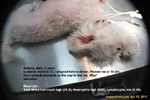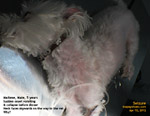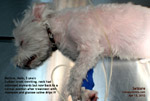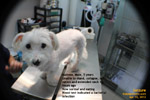941. The 5-year-old Maltese "vomited" and collapsed at 10 pm - Standard Operating Procedure
The Maltese's neck extended skywards and he was recumbent. "His eyes are so staring and he has saliva coming out of his mouth," the mother said to me while the father and teenaged daughter were worried.
Naturally, the first thing to do is to give the diazepam to resolve the sky-looking head.
I don't know whether diazepam will affect the blood analysis but I prefer to do the basic. Take the blood before any drug is administered. That will be the basic of scientific research, in my opinion.
"We need to check for glucose level to see if there is hypoglycaemia," I said. "We can take some more blood after giving the IV drip." I had also included the glucose and multivitamin amounts to be added in the normal saline drip. The Hartmann's solution would be given soon.
"You can't take the blood to check for glucose level after administering glucose", Dr Daniel had pointed out.
After taking the blood, we gave glucose 50 ml IV, Normal saline and diazepam amongst others.
Within 1 minute, the dog's neck returned to normal position and was not rigid anymore. I asked the owners to come and see. The daughter's eyes were red.
"His eyes are closed and no more staring," the mum noted. Eyes are windows to the soul in this case. I mean, dilated pupils can indicate impending death from uncontrolled seizures and the mum must have meant "staring dilated pupils" as staring eyes.
"What's the cause of this seizure?," the mum asked me. She had consulted me earlier about this Maltese having ear infections 5 months ago but there is no more redness or ear itchiness now.
"It is hard to say. If it is sudden, it could be an injury to the brain. Is the Maltese a very active dog?" I asked.
"Yes, yes," the mum said. "He jumps up and down, to greet us, and he was doing it before dinner."
"The blood test will give us some answers," I said.
Dr Daniel said to me that the dog could be suffering from hypoglycaemia and went into fits as he was fed only once a day instead of twice a day. "Possible," I said. "Wait for the blood glucose result."
In conclusion, the standard operation procedure of taking the blood before treatment is still the best. Take blood before doing any treatment will NOT result in conflicting test results as, for example, after administering glucose and taking blood during emergency confusion will make the test for glucose invalid. There must always be a SOP in emergencies.
PART 2. The owner came for the Maltese
in the morning. She accepted my advice to let the 5-year-old dog
stay overnight at Toa Payoh Vets for observation. No fits. As good
as gold. The active dog just jumped and pawed her legs as she
settled the bill. Tongue pinkish as normal.
"Most likely a bacterial infection based on increase in total white
cell count and a very high neutrophil count. Neutrophils are
produced in large numbers by the dog's body to fight against
bacterial infection. Did the dog go outdoors last few days?"
"No," she said. "This dog stays indoors and if he goes out, is not
allowed to sniff the grass."
It was a surprising finding in the blood test. Evidence-based
medicine is the best way as the owner wants answers and in this
case, the blood test had been taken before treatment and provided
some answers.
"There is a possibility of low blood glucose which can lead to
(hypoglycaemia) fits in your Maltese," I said. "The lab report
mentioned a possible glycolysis and a repeat test. A blood test 2-4
weeks later is needed."
This is one of the cases where the owner got the vet to treat the
seizure dog promptly and the blood test was taken. All dogs with
fits must have blood tested unless the owner objects to them.
Practise evidence-based medicine.
In this case, acute bacterial meningitis was likely to be present in
the dog. As the owner had not delayed treatment, the antibiotics and
medication given had got rid of the bacteria and the dog recovered
the next day, 12 hours after admission.
NOTES ON ACUTE BACTERIAL MENINGITIS
1. Bacterial meningitis is an infection of the meninges which are
the membranes covering the brain and spinal cord.
2. Causes: viral, bacterial and fungal infections.
3. Most common bacteria in people meningitis include:
3.1 Streptococcus pneumoniae (pneumonococcus),
3.2 Neisseria meningitidis (meningococcus)- upper respiratory
infection bacteria enters bloodstream
3.3 Haemophilus influenzae (haemophilus) - upper respiratory
infection, ear infection (otitis media) or sinus infections.
3.4 Listeria monocytogenes (listeria) - soil, dust,
contaminated food.
When I was studying vet medicine in Glasgow in 1969-1974, I still
remember my lectures about listeria in British pigs causing brain
diseases. Antibiotics erythromycin were very effective.
Probably this dog had got a bacterial infection like listeriosis
(blood test - total white cell count and neutrophils increase).
The inflammation and swelling of the meninges caused "headache"
(collapse suddenly according to the owner and vomiting), fever (not
present in this case), neck stiffness (see image of the dog
looking skywards below) and abnormal mental state (eye-staring
complaint from the owner and salivation due to fits).
SPINAL FLUID TEST will confirm what type of
bacteria is involved. Due to economic reasons, this was not done.
Bacterial meningitis can occur over a few hours or in 2 to 3 days.
Delays in treatment can lead to permanent brain damage (coma, fits)
or death.
Prompt antibiotic treatment enabled him to recover fully. Where the
dog got infected (contaminated food, sniffing soil etc) is a
mystery. This dog seldom goes out and therefore may not have the
resistance to the bacteria. I had treated him for an ear infection
two months ago but his ears had only a bit of yellow wax.
P.S. Reference to human acute bacterial
meningitis.
There is an interesting case of a Singaporean woman who contacted
acute bacterial meningitis while holidaying in Bangkok and became
unconscious for 3 months.
(Straits Times, Apr 18, 2012, Home, Pg B3, Ex-coma patient in flap
over lease)
 TOA
PAYOH VETS
TOA
PAYOH VETS




